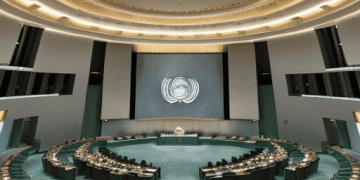A recent study from Edinburgh Business School at Heriot-Watt University sheds new light on the role of neutrality in international relations, revealing its greater significance in global stability than previously acknowledged. The research, which analyzed nearly 200 years of data between 1816 and 2007, challenges traditional views that have often overlooked or mischaracterized neutrality.
The study, led by Dr. David Dekker, a Research Fellow at Edinburgh Business School, examined data from the Correlates of War (CoW) project, which tracks global alliances, hostilities, and neutral relationships. The findings suggest that neutral relationships were more prevalent over a long period than alliances or hostilities and played a key role in maintaining international stability.
“Neutrality has often been categorized as either positive or negative, but this oversimplification misses the complex, multi-layered nature of international relations,” said Dr. Dekker. “Our research introduces neutrality as a third category, offering a more granular understanding of the dynamic between countries.”
The study proposes a new analytical framework called “balance correlations,” which identifies 26 new relationship groupings between countries. This approach provides policymakers with a deeper understanding of international relations, potentially informing strategies for a range of fields, from trade policies to educational environments.
Dr. Dekker explained that this new perspective could be particularly useful for understanding global supply chain dynamics. “By quantifying previously unrecognized relational structures, our research could help develop more effective strategies in areas such as international trade and conflict resolution,” he said.
The researchers also found that neutrality can influence the formation and dissolution of social ties, sometimes leading to greater conflict, especially in periods when neutrality is widely adopted. They identified the years between 1867 and 1936, marked by global conflicts such as World War I, as a particularly turbulent period dominated by neutrality behavior.
The study also extends the theory of interpersonal relations, balance theory, developed during World War II by Austrian psychologist Fritz Heider. This theory suggests that relationships among three parties—such as countries—can influence the overall balance of sentiment and actions between them.
The study, titled “Balance Correlations, Agentic Zeros, and Networks: The Structure of 192 Years of War and Peace,” has been published in the journal PLOS ONE. The co-authors include David Krackhardt from Carnegie Mellon University, Patrick Doreian from the University of Pittsburgh, and Pavel N. Krivitsky from the University of New South Wales.
The findings present a shift in the understanding of international relations and could have far-reaching implications for diplomacy, conflict resolution, and global trade strategies.
Discover the latest in supply chain logistics news on The Supply Chain Report. Free international trade tools are available at ADAMftd.com.
#NeutralityInGlobalPolitics #InternationalRelationsResearch #DiplomacyAndNeutrality #GlobalPoliticalDynamics #NeutralityInConflictResolution

















